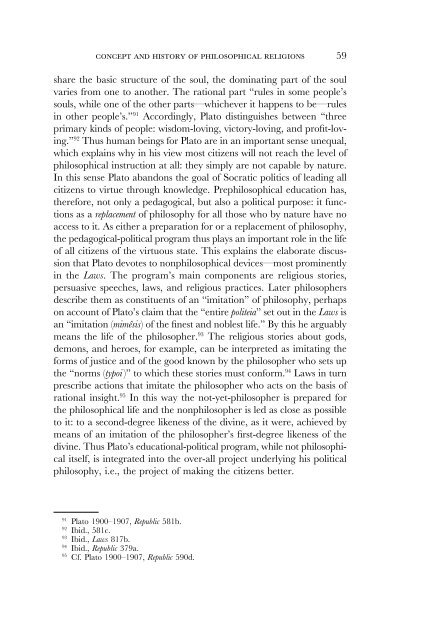Download PDF - Carlos F. Fraenkel
Download PDF - Carlos F. Fraenkel
Download PDF - Carlos F. Fraenkel
Create successful ePaper yourself
Turn your PDF publications into a flip-book with our unique Google optimized e-Paper software.
concept and history of philosophical religions 59share the basic structure of the soul, the dominating part of the soulvaries from one to another. The rational part “rules in some people’ssouls, while one of the other parts—whichever it happens to be—rulesin other people’s.” 91 Accordingly, Plato distinguishes between “threeprimary kinds of people: wisdom-loving, victory-loving, and profit-loving.”92 Thus human beings for Plato are in an important sense unequal,which explains why in his view most citizens will not reach the level ofphilosophical instruction at all: they simply are not capable by nature.In this sense Plato abandons the goal of Socratic politics of leading allcitizens to virtue through knowledge. Prephilosophical education has,therefore, not only a pedagogical, but also a political purpose: it functionsas a replacement of philosophy for all those who by nature have noaccess to it. As either a preparation for or a replacement of philosophy,the pedagogical-political program thus plays an important role in the lifeof all citizens of the virtuous state. This explains the elaborate discussionthat Plato devotes to nonphilosophical devices—most prominentlyin the Laws. The program’s main components are religious stories,persuasive speeches, laws, and religious practices. Later philosophersdescribe them as constituents of an “imitation” of philosophy, perhapson account of Plato’s claim that the “entire politeia” set out in the Laws isan “imitation (mimêsis) of the finest and noblest life.” By this he arguablymeans the life of the philosopher. 93 The religious stories about gods,demons, and heroes, for example, can be interpreted as imitating theforms of justice and of the good known by the philosopher who sets upthe “norms (typoi )” to which these stories must conform. 94 Laws in turnprescribe actions that imitate the philosopher who acts on the basis ofrational insight. 95 In this way the not-yet-philosopher is prepared forthe philosophical life and the nonphilosopher is led as close as possibleto it: to a second-degree likeness of the divine, as it were, achieved bymeans of an imitation of the philosopher’s first-degree likeness of thedivine. Thus Plato’s educational-political program, while not philosophicalitself, is integrated into the over-all project underlying his politicalphilosophy, i.e., the project of making the citizens better.91Plato 1900–1907, Republic 581b.92Ibid., 581c.93Ibid., Laws 817b.94Ibid., Republic 379a.95Cf. Plato 1900–1907, Republic 590d.



